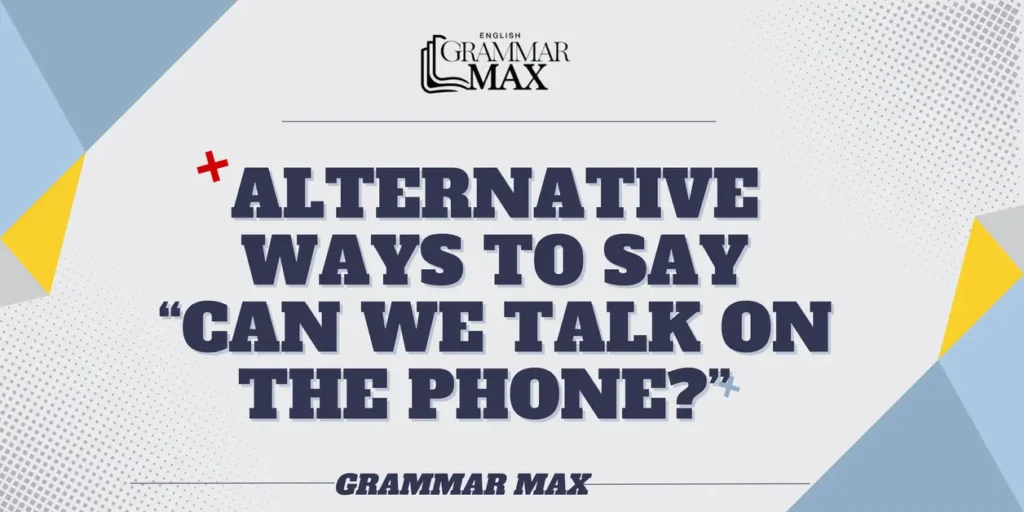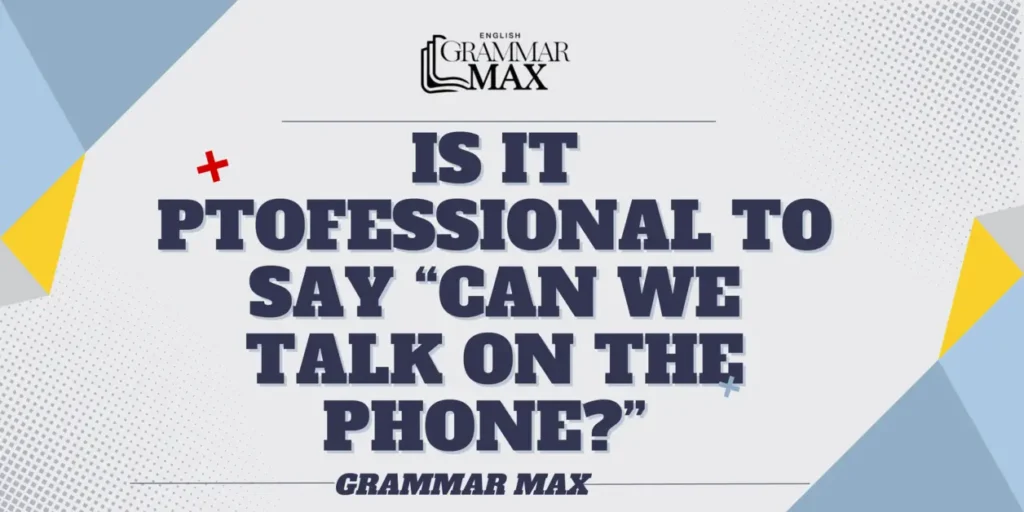Can We Talk On the Phone? In the professional world, there are countless situations where a direct phone conversation is essential for clear communication and efficient exchange of ideas. Whether you’re clarifying project details, discussing sensitive information, or setting up a meeting, knowing how to ask to talk on the phone in a polite and professional way is invaluable.
We’ll explore 20 professional ways to ask “Can we talk on the phone?” Each alternative comes with usage scenarios and best practices to help you tailor your request in emails, messages, or formal settings. With these refined phrases, you’ll ensure that your request for a phone discussion aligns with workplace etiquette and promotes productive interactions.
Alternative Ways to say “can we talk on the phone”

You can use these ways instead to say “Can We Talk On the Phone”:
- Could We Schedule a Call at Your Convenience?
- Can I Talk to You On the Phone About This?
- Would You Be Available to Discuss This Over a Call?
- Could We Arrange a Call to Go Over the Details?
- Let’s Set Up a Call to Review the Topic
- Is It Possible to Have a Quick Phone Call About This?
- Shall We Talk Over the Phone to Clarify?
- Would a Phone Call Be Convenient for You to Discuss This?
- Can We Arrange a Call to Discuss the Matter?
- Is Now a Good Time to Talk on the Phone?
- May We Continue This Conversation Via Telephone?
- Could We Discuss This Topic Through a Phone Call?
- Would a Quick Call Help to Elaborate on the Points?
- Is There a Convenient Time for a Phone Discussion?
- Could We Talk This Through Over a Call?
- Let’s Schedule a Call to Address the Matter
- May I Call You to Discuss This at Your Earliest Convenience?
- Could We Arrange a Quick Phone Meeting?
- Do You Have Time for a Phone Chat About This?
- Can We Discuss This Over a Phone Call at a Suitable Time?
Could We Schedule a Call at Your Convenience?
This phrase is a polite way to request a phone discussion while showing respect for the other person’s schedule. It suggests that you are open to arranging a convenient time for them to call.
It’s ideal for when you don’t need an immediate response but want to discuss a topic in more depth. Using this phrase communicates your flexibility and professional courtesy in setting up the conversation.
Best Use:
Best for professional emails when you want to respect the recipient’s time. This phrase shows flexibility and consideration, making it ideal for reaching out to clients or managers. Use it to request a detailed discussion without imposing a specific time.
Example: “Hi Emily, could we schedule a call at your convenience to go over the project details? Let me know a suitable time that works for you.”
Can I Talk to You On the Phone About This?
This question is direct and often suitable for quick requests or informal channels, such as instant messaging. It’s useful when you need to clarify something quickly but still want to be polite.
Asking this way implies that a phone call would be more effective than written communication. This straightforward phrasing can be used when you need a response promptly but still want to respect their time.
Example: “Hi Alex, can I talk to you on the phone about this today? I’d like to clarify some details before our meeting.”
Would You Be Available to Discuss This Over a Call?
This phrase is courteous and can be used with clients, colleagues, or senior team members. By asking about availability, it acknowledges the recipient’s time constraints.
It’s also great for requesting a call without urgency, showing respect for their schedule and needs. This phrase works well in emails where formality is preferred.
Best Use:
Suitable for professional environments where you need to coordinate schedules. Use it in emails to gently request the recipient’s availability for a phone conversation. It’s best for non-urgent matters that still need attention.
Example: “Hello Mr. Thompson, would you be available to discuss this over a call? I believe a quick conversation would be beneficial. Please let me know your earliest availability.”
Could We Arrange a Call to Go Over the Details?
This option is suitable when you need to discuss complex information or ensure thorough understanding of a topic. It implies that a phone call would be beneficial for reviewing specific details.
It’s ideal for scenarios where email exchanges might be inefficient due to the complexity of the matter. Using this phrase signals that clarity is important for the conversation.
Example: “Hi Jordan, could we arrange a call to go over the details of the proposal? I think discussing them over the phone would be more effective.”
Let’s Set Up a Call to Review the Topic
This phrase suggests a focus on a particular topic and is helpful when discussing complex projects. It emphasizes a structured approach, indicating you want a review.
The phrasing works well for inviting someone to collaborate on ideas or objectives. It is suitable for emails or formal project updates where both parties are expected to contribute.
Best Use:
Best used in collaborative environments, such as team projects or partnership discussions. This phrase suggests a structured approach, indicating a focused review is needed. It’s suitable for conversations where both parties need to contribute actively.
Example: “Hi Linda, let’s set up a call to review the topic before the deadline. It’ll help us align on key points and ensure clarity.”
Is It Possible to Have a Quick Phone Call About This?
This phrase is ideal for when a quick response is needed. It’s polite but straightforward, letting the recipient know you want to keep the call brief.
It’s great for informal requests, especially in instant messaging or email. Using “quick” shows you respect their time and only need a short conversation.
Best Use:
Perfect for urgent inquiries or when a brief conversation will clarify things faster. Use this phrase when you need an immediate answer but want to keep it short. Ideal for informal channels or instant messaging.
Example: “Hi Sam, is it possible to have a quick phone call about this? I’d like to address some points that may need immediate attention.”
Shall We Talk Over the Phone to Clarify?
This option works well for situations where clarity is crucial, especially if previous emails or messages have been unclear. It implies that a verbal discussion would be more effective.
Using “clarify” communicates a collaborative tone, making the phrase suitable for colleagues or team members. It’s also ideal for emails, where you need to resolve misunderstandings.
Example: “Hello Jennifer, shall we talk over the phone to clarify the latest updates? A phone conversation may help in avoiding misunderstandings.”
Would a Phone Call Be Convenient for You to Discuss This?
This phrase is both polite and considerate, focusing on the other person’s convenience. It allows them to suggest a suitable time for a phone call.
It’s perfect for formal emails or requests to senior staff. This phrase works well when you’re asking someone with a busy schedule for their input.
Best Use:
A respectful way to check if a call fits the recipient’s schedule. Best used in formal or semi-formal emails where you’re trying to show consideration. Ideal for when you want to discuss something thoroughly but can wait for their availability.
Example: “Good afternoon, would a phone call be convenient for you to discuss this? I want to make sure we’re on the same page before moving forward.”
Can We Arrange a Call to Discuss the Matter?
This phrase is great for formal requests, especially for sensitive topics that require a private conversation. It signals that discussion is preferred over written correspondence.
This is an ideal choice for important topics that need a thorough approach. Using “discuss” implies a collaborative tone, making it suitable for partners or team leaders.
Example: “Hi Sarah, can we arrange a call to discuss the matter? It would be helpful to go through it in detail and align on our approach.”
Is Now a Good Time to Talk on the Phone?
This phrase is a quick and efficient way to request a phone call immediately. It’s useful in informal channels where you want to check if the other person is free right now.
It’s best used in instant messaging or spontaneous email requests. This phrase is direct, letting you quickly assess if they’re available to speak.
Best Use:
Ideal for instant messaging or direct requests when you need to talk immediately. Use this phrase to check if the other person is free to speak right away. Great for quick issues or urgent matters that need direct answers.
Example: “Hi James, is now a good time to talk on the phone? I just had a quick question regarding the recent client feedback.”
Is it Professional to Say: Can We Talk On the Phone?

Using “Can We Talk On the Phone” can be appropriate and professional in various settings, especially when a quick, clear discussion is necessary. This phrase is direct and suits informal to semi-formal situations, making it versatile for both colleagues and clients.
However, in highly formal environments, phrasing it more courteously, like “Would You Be Available for a Call?,” may be preferred to show extra politeness and respect.
Pros
- Direct and Time-Efficient: Saves time by getting straight to the point.
- Easily Understood: Makes the intent for a phone conversation clear.
Cons
- Lacks Formality: May seem too casual in very formal contexts.
- Can Appear Impersonal: Doesn’t always convey respect for the recipient’s schedule.
Frequently Asked Questions
Can We Talk on the Phone or Over the Phone?
Both are correct, but “on the phone” is more commonly used in American and British English for initiating a phone conversation.
How Do You Ask Someone to Speak on the Phone?
Politely ask, “Would you be available for a call?” or “Could we discuss this on the phone?” to show respect for their availability.
Is Talking on the Phone Correct?
Yes, “talking on the phone” is correct and commonly used to describe having a phone conversation.
Can We Talk in Call or On Call?
The correct phrase is “on a call” or “on the phone,” as “in call” is not standard in English.
Conclusion
Making a professional request to talk on the phone is essential for effective communication in the workplace. By choosing the right phrase for each scenario, you ensure your message is courteous and aligned with professional norms.
Whether you need a quick response or an in-depth discussion, these phrases will guide you in requesting a phone call that respects the recipient’s time and preferences. With these alternatives, you can approach phone conversations confidently, enhancing both communication efficiency and workplace relationships.

William Henry is a writer for Grammar Max, a blog that focuses on synonyms and phrases. He loves exploring the quirks of the English language and enjoys helping readers improve their vocabulary. William’s articles are easy to read, fun, and full of useful tips for anyone looking to better understand and use English. Whether you’re a student, a professional, or just someone interested in language, William’s writing on Grammar Max makes learning about words and their meanings simple and enjoyable.
